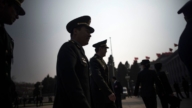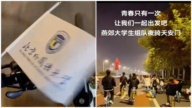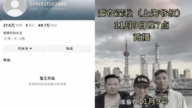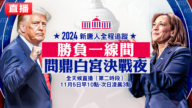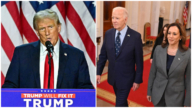【新唐人2011年10月4日讯】中共国务院总理温家宝再提政治改革,呼吁党政分开、司法独立等,这是他近40天来,第6次提到政改。温家宝如此频繁提及政改的背景及意图,引起各方关注。评论人士认为,这显示中共高层的分裂,并凸显中国的社会矛盾已经达到了不调和的状态。
温家宝的政治改革论,引发新一轮中共左派和右派的博弈,各方猜测中共的内部分裂和内斗激烈。另有人认为,中共的思想体系崩溃,治国理念陷入混乱,是灭亡的先兆。
特别是今年9月14号,温家宝在大连出席夏季达沃斯论坛时,再度高调呼吁政治体制改革,其中五大要点为:第一、依法治国,改变“以党代政”的现象,改革党和国家的领导制度;第二、推进社会公平正义;第三、维护司法公正独立;第四、保障人民的民主权利,最主要的是选举权、知情权、监督权 和参与权;第五则是反腐败。
温家宝甚至表明过要为推动政改“风雨不改、至死方休”。
但是,中共当局不仅没有丝毫推动政改迹象,党的喉舌有时甚至立即批驳温家宝的言论,吴邦国等保守派也曾暗中反击,撰文捍卫“一党专政”,指绝不搞“三权分立”。有时更会收紧政治控制,甚至围剿民间的人权斗士。
中国历史学专家、原首都师范大学科学学院副教授李元华,表示温家宝喊改革也只不过是口头上的,没有实质上的作用:
原首都师范大学科学学院副教授李元华:“他已经说过许多次了,根本也不可能实施,也不能实施,所以就只能是空喊,如果说他从中共维护自己的专制的那个角度来讲,可能能起到 一个尚对中共抱有希望的人,可能能迷糊一些人,更多的人可能早识破了。他喊不喊政改也没有实际的作用。”
政论家胡平在接受《大纪元》采访时表示,一旦政治改革启动,中共不但会失去垄断的政治权力,而且还会因经济上的腐败受到清算。整个官僚集团相当恐惧和敌视政改。
希望之声时事评论员蓝述:“那温家宝之所以他要把这个东西再一次拿出来说,实际上它只不过是表明中国社会的社会矛盾已经达到了不调和的这种状态。,就温家宝他个人的情况来讲呢,温家宝他马上要下台了,他也当不了一年多的总理了,他希望给自己留下一个好一点的名声。”
BBC中文网报导,中国自今年2月份茉莉花革命爆发以来,时不时传出异议人士被打压,让人对温家宝政改的诚意感到质疑。中国事务评论人士林和立对法新社说,当前的镇压浪潮至少维持到明年中共十八大之后。
李元华认为,中国的老百姓应该跳出中共宣传的模式,不对政改抱持任何希望。
原首都师范大学科学学院副教授李元华:“因为中共的本质实际上已经决定他不可能变成一个为人民着想的一个政党,它的任何措施不可能从人民利益的角度去出发,它只是去维护它的一党统治,延续它的统治。”
2003年就任中共总理后,温家宝不下十次公开谈论政改,BBC中文网指温此次是“例行”谈政改。
新唐人记者刘慧、林慧心、郭敬采访报导。
Recently, Chinese Premier Wen Jiabao again
proposed political reform,
calling for separation between Party and government,
and judicial independence.
This is the 6th time that he proposed political reform
in the past 40 days.
Wen’s agenda behind these proposals
has attracted widespread public attention.
Commentators believe that
this shows the division in CCP leadership,
as well as the irreconcilable contradictions
in Chinese society.
Wen’s new political reform proposal triggered
another round of fights between the leftists and rightists,
showing the internal division within the CCP.
Some people believe that CCP’s administrative principles
have collapsed, which is a precursor to its falling apart.
This year, Premier Wen Jiabao attended
the Summer Davos in Dalian on Sept 14th.
He once again called for high-profile political reform,
suggesting five main points: 1) to rule the state to the law,
change the Party’s dominance over government,
and reform the Party’s leadership system;
2) to promote social fairness and justice;
3) to maintain judicial impartiality and independence;
4) protect people’s democratic rights,
in particular the right to vote, right to be informed,
to supervise and to participate;
5) to fight against corruption.
Wen Jiabao even claimed that he would spare effort
to promote political reform “until his death."
However, the Chinese authorities show no intention
of promoting political reform.
Instead, the Party mouthpiece media,
sometimes even immediately, refuted Wen’s speech.
Wu Bangguo and other conservatives have fought back,
writing articles to defend the “one-party dictatorship."
They claimed never to exercise “separation of powers,"
and even tightened political control
to suppress human rights movements.
Li Yuanhua, a Chinese historian and former Associate Professor
in the Department of Science at Capital Normal University,
said Wen’s pronouncement goes no further
than mere speech, without any substantial impact.
Li Yuanhua, a Chinese historian and former Associate Professor
in the Department of Science at Capital Normal University:
He[Wen] has said it many times,
but it is impossible to be implemented.
It remains only empty talk.
If someone still has hope for the CCP,
he might be deceived by Wen’s words,
but more people have already seen through it.
They know that however loud he calls,
there is going to be no change.
In an interview by The Epoch Times,
political critic Hu Ping said, once political reform gets started,
CCP will not only lose political power,
but also face punishment for their financial corruption.
The whole bureaucratic group fears
and resists political reform.
Lan Shu, critic at Sound of the Hope Radio:
“Wen proposed political reform once again
only to show that the social conflicts in China
are already irreconcilable.
Wen is to step down soon,
so he wants to gain a better reputation.”
BBC Chinese reported that many dissidents in China have
been suppressed since the Jasmine Revolution in February,
causing doubts about the sincerity of Wen’s words.
Chinese affairs expert Willy Lam told AFP
that the current wave of repression will continue
at least until the 18th CCP Assembly next year.
Li Yuanhua said that Chinese people should jump out of
CCP’s propaganda and abandon any hope for political reform.
Li Yuanhua, a Chinese historian and former Associate Professor
in the Department of Science at Capital Normal University:
“The CCP’s nature determines that
it can never become a party for the people.
Whatever measures it takes,
it is not out of concern for the people,
but only for its rule and dictatorship.
After taking office in 2003, Chinese Premier Wen Jiabao
has talked about political reform at least ten times.
BBC Chinese refers to the new proposal
as “routine talk" about political reform.
NTD reporters Liu Hui, Lin Huixin and Guo Jing


